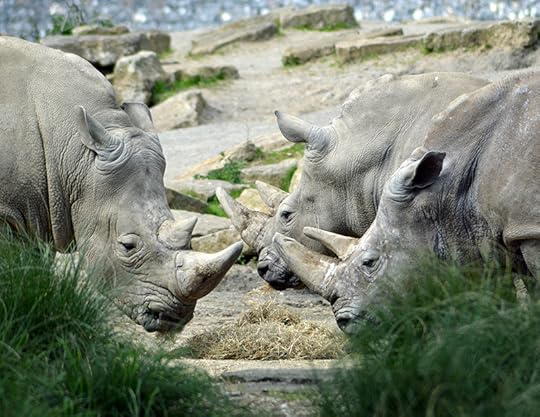C.E. Murphy's Blog, page 107
December 31, 2013
Kitsnaps: Rhinos
Rhinos
Rhinos: the January picture for the 2014 CE Murphy photographic calendar.
I was ridiculously pleased when I saw this printed out. I was afraid all the shades of grey would just blend and be blah, but they turned out beautifully crisp and defined!
The post Kitsnaps: Rhinos appeared first on The Essential Kit.
Recent Reads: A Stranger at Green Knowe
I admit that I have stayed up slightly too late tonight so I could add one more book onto my “books read in 2013″ list, which I believe has capped out at about 65 books. Not quite as good as last year, when I think I managed around 75, but a lot better than my nadir of 15. @.@
***
I re-read all of the Green Knowe books repeatedly as a child, but reading them again as an adult has been a revelation. The descriptions and the ability to reveal the world the way a child sees it are unparalleled thr...
2014 Thinks To Do
Okay, so big plans for 2014 include:
- rewatching the Ron Perlman/Linda Hamilton Beauty and the Beast as part of a year-long thing with Stephen Aryan and Liz de Jager. We might even have a weekly Discussion Blog about that week’s show. Anybody who wants to can join in!
- (re)reading all the Guy Gavriel Kay novels, of which there are now 12, one a month in publication order, again with weekly discussion. We’ll be starting with THE SUMMER TREE in January, with a goal of reading 4 chapters a week....
December 30, 2013
my best(worst) critique ever
Back at the start of the century (!) I submitted a manuscript to a writing contest, which I finaled in and went to the conference the contest was associated with, because finalists got to meet an editor and I wanted a professional opinion on whether what I was doing was any good.
Finalists also wore little ribbons saying they were finalists in their genre. The SF/F ones were yellow. A woman came up to me and said, “Oh! You’re a SF&F finalist! Were you one of mine? I’m one of the judges!”
I said...
December 29, 2013
Oh look!
Er. Something like that, anyway. :)
December 28, 2013
the TBRS project
Y’know, I’m genuinely a little concerned about my TBR shelf project (the one where I have to clear out about 70% of my TBR shelf before I can buy anything new), just because it’s harder to read fiction when I’m writing it* and I have to get an awful lot of writing done next year. Somehow.
If I was planning a massive *re-read* project (aside from the GGK thing, which is not massive), I’d be in much better shape. It’s far easier to read things I’ve already read. Less anticipation, I think, and t...
December 27, 2013
Catie’s Ham & Bean Soup
Start by roasting a big ham with a lot of fat on it. Ideally roast it in a cast iron pan, so you don’t have to pour the melted fat into another pan when you take it out of the oven, but whatever works for you.
Make an egregious amount of ham gravy. Three cups or more.
(You’ve never made gravy? It’s easy. Take a half cup of flour or so and put your sautee pan of ham fat on a decently high heat. Sprinkle in some of the flour. Mix it with a fork until it’s blended. Keep doing this in small amount...
December 24, 2013
Magic & Manners: Chapter Three
With ongoing apologies to Jane Austen, and a wish for all to have a Happy Midwinter Holiday, I present to you the third chapter of MAGIC & MANNERS, which is what happens when I get it into my head to wonder what PRIDE & PREJUDICE would be like if it was not a lack of wealth that beleaguered the Bennet sisters, but rather an excess of magic…
Chapter Three lies behind the cut. :)
Chapter Three
Indeed, for three full days Mr Dover found it expedient to confine himself to his l...
December 21, 2013
birthday of the unconquered sun
I cannot for love or money get this Birthday of the Unconquered Sun account to work, so I’m going to have to bail on that aspect of it. However, if people want to send pictures in to my email address botuc at OUTLOOK dot COM that would be great!, that would be cool!
The post birthday of the unconquered sun appeared first on The Essential Kit.
December 20, 2013
Picoreview: Frozen
Picoreview: Frozen: conflicting.
There are a lot of things I didn’t like about this movie. The music is possibly the worst I’ve ever heard in a Disney film. Usually their songs tend to fit into the narrative pretty well; this really felt like the songs were being forced to fit into spaces unnaturally, and that these characters would prefer to be speaking.
There were any number of times that I found myself thinking how much I would like to have seen it done in hand-drawn animation. There were mo...




